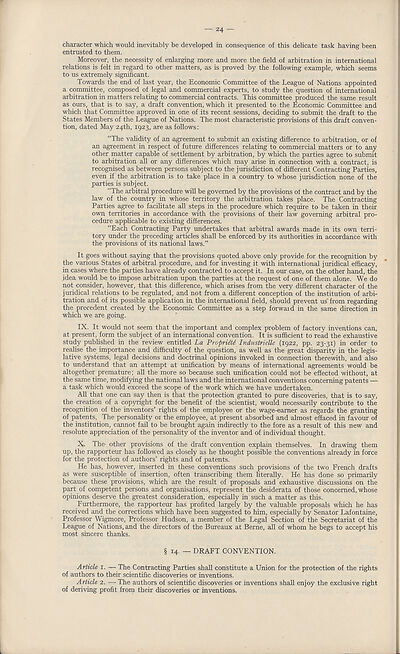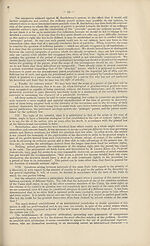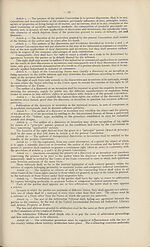Download files
Complete book:
Individual page:
Thumbnail gallery: Grid view | List view

— 24 —
character which would inevitably be developed in consequence of this delicate task having been
entrusted to them.
Moreover, the necessity of enlarging more and more the field of arbitration in international
relations is felt in regard to other matters, as is proved by the following example, which seems
to us extremely significant.
Towards the end of last year, the Economic Committee of the League of Nations appointed
a committee, composed of legal and commercial experts, to study the question of international
arbitration in matters relating to commercial contracts. This committee produced the same result
as ours, that is to say, a draft convention, which it presented to the Economic Committee and
which that Committee approved in one of its recent sessions, deciding to submit the draft to the
States Members of the League of Nations. The most characteristic provisions of this draft conven¬
tion, dated May 24th, 1923, are as follows:
“The validity of an agreement to submit an existing difference to arbitration, or of
an agreement in respect of future differences relating to commercial matters or to any
other matter capable of settlement by arbitration, by which the parties agree to submit
to arbitration all or any differences which may arise in connection with a contract, is
recognised as between persons subject to the jurisdiction of different Contracting Parties,
even if the arbitration is to take place in a country to whose jurisdiction none of the
parties is subject.
“The arbitral procedure will be governed by the provisions of the contract and by the
law of the country in whose territory the arbitration takes place. The Contracting
Parties agree to facilitate all steps in the procedure which require to be taken in their
own territories in accordance with the provisions of their law governing arbitral pro¬
cedure applicable to existing differences.
“Each Contracting Party undertakes that arbitral awards made in its own terri¬
tory under the preceding articles shall be enforced by its authorities in accordance with
the provisions of its national laws.”
It goes without saying that the1 provisions quoted above only provide for the recognition by
the various States of arbitral procedure, and for investing it with international juridical efficacy,
in cases where the parties have already contracted to accept it. In our case, on the other hand, the
idea would be to impose arbitration upon the parties at the request of one of them alone. We do
not consider, however, that this difference, which arises from the very different character of the
juridical relations to be regulated, and not from a different conception of the institution of arbi¬
tration and of its possible application in the international field, should prevent us from regarding
the precedent created by the Economic Committee as a step forwaid in the same direction in
which we are going.
IX. It would not seem that the important and complex problem of factory inventions can,
at present, form the subject of an international convention. It is sufficient to read the exhaustive
study published in the review entitled La ProprMte Industrielle (1922, pp. 23-31) in order to
realise the importance and difficulty of the question, as well as the great disparity in the legis¬
lative systems, legal decisions and doctrinal opinions invoked in connection therewith, and also
to understand that an attempt at unification by means of international agreements would be
altogether premature; all the more so because such unification could not be effected without, at
the same time, modifying the national laws and the international conventions concerning patents —
a task which would exceed the scope of the work which we have undertaken.
All that one can say then is that the protection granted to pure discoveries, that is to say,
the creation of a copyright for the benefit of the scientist, would necessarily contribute to the
recognition of the inventors’ rights of the employee or the wage-earner as regards the granting
of patents. The personality 01 the employee, at present absorbed and almost effaced in favour of
the institution, cannot fail to be brought again indirectly to the fore as a result of this new and
resolute appreciation of the personality of the inventor and of individual thought.
X. The- other provisions of the draft convention explain themselves. In drawing them
up, the rapporteur has followed as closely as he thought possible the conventions already in force
for the protection of authors’ rights and of patents.
He has, however, inserted in these conventions such provisions of the two French drafts
as were susceptible of insertion, often transcribing them literally. He has done so primarily
because these provisions, which are the result of proposals and exhaustive discussions on the
part of competent persons and organisations, represent the desiderata of those concerned, whose
opinions deserve the greatest consideration, especially in such a matter as this.
Furthermore, the rapporteur has profited largely by the valuable proposals which he has
received and the corrections which have been suggested to him, especially by Senator Lafontaine,
Professor Wigmore, Professor Hudson, a member of the Legal Section of the Secretariat of the
League of Nations, and the directors of the Bureaux at Berne, all of whom he begs to accept his
most sincere thanks.
§ 14. — DRAFT CONVENTION.
Article 1. —The Contracting Parties shall constitute a Union for the protection of the rights
of authors to their scientific discoveries or inventions.
Article 2. — The authors of scientific discoveries or inventions shall enjoy the exclusive right
of deriving profit from their discoveries or inventions.
character which would inevitably be developed in consequence of this delicate task having been
entrusted to them.
Moreover, the necessity of enlarging more and more the field of arbitration in international
relations is felt in regard to other matters, as is proved by the following example, which seems
to us extremely significant.
Towards the end of last year, the Economic Committee of the League of Nations appointed
a committee, composed of legal and commercial experts, to study the question of international
arbitration in matters relating to commercial contracts. This committee produced the same result
as ours, that is to say, a draft convention, which it presented to the Economic Committee and
which that Committee approved in one of its recent sessions, deciding to submit the draft to the
States Members of the League of Nations. The most characteristic provisions of this draft conven¬
tion, dated May 24th, 1923, are as follows:
“The validity of an agreement to submit an existing difference to arbitration, or of
an agreement in respect of future differences relating to commercial matters or to any
other matter capable of settlement by arbitration, by which the parties agree to submit
to arbitration all or any differences which may arise in connection with a contract, is
recognised as between persons subject to the jurisdiction of different Contracting Parties,
even if the arbitration is to take place in a country to whose jurisdiction none of the
parties is subject.
“The arbitral procedure will be governed by the provisions of the contract and by the
law of the country in whose territory the arbitration takes place. The Contracting
Parties agree to facilitate all steps in the procedure which require to be taken in their
own territories in accordance with the provisions of their law governing arbitral pro¬
cedure applicable to existing differences.
“Each Contracting Party undertakes that arbitral awards made in its own terri¬
tory under the preceding articles shall be enforced by its authorities in accordance with
the provisions of its national laws.”
It goes without saying that the1 provisions quoted above only provide for the recognition by
the various States of arbitral procedure, and for investing it with international juridical efficacy,
in cases where the parties have already contracted to accept it. In our case, on the other hand, the
idea would be to impose arbitration upon the parties at the request of one of them alone. We do
not consider, however, that this difference, which arises from the very different character of the
juridical relations to be regulated, and not from a different conception of the institution of arbi¬
tration and of its possible application in the international field, should prevent us from regarding
the precedent created by the Economic Committee as a step forwaid in the same direction in
which we are going.
IX. It would not seem that the important and complex problem of factory inventions can,
at present, form the subject of an international convention. It is sufficient to read the exhaustive
study published in the review entitled La ProprMte Industrielle (1922, pp. 23-31) in order to
realise the importance and difficulty of the question, as well as the great disparity in the legis¬
lative systems, legal decisions and doctrinal opinions invoked in connection therewith, and also
to understand that an attempt at unification by means of international agreements would be
altogether premature; all the more so because such unification could not be effected without, at
the same time, modifying the national laws and the international conventions concerning patents —
a task which would exceed the scope of the work which we have undertaken.
All that one can say then is that the protection granted to pure discoveries, that is to say,
the creation of a copyright for the benefit of the scientist, would necessarily contribute to the
recognition of the inventors’ rights of the employee or the wage-earner as regards the granting
of patents. The personality 01 the employee, at present absorbed and almost effaced in favour of
the institution, cannot fail to be brought again indirectly to the fore as a result of this new and
resolute appreciation of the personality of the inventor and of individual thought.
X. The- other provisions of the draft convention explain themselves. In drawing them
up, the rapporteur has followed as closely as he thought possible the conventions already in force
for the protection of authors’ rights and of patents.
He has, however, inserted in these conventions such provisions of the two French drafts
as were susceptible of insertion, often transcribing them literally. He has done so primarily
because these provisions, which are the result of proposals and exhaustive discussions on the
part of competent persons and organisations, represent the desiderata of those concerned, whose
opinions deserve the greatest consideration, especially in such a matter as this.
Furthermore, the rapporteur has profited largely by the valuable proposals which he has
received and the corrections which have been suggested to him, especially by Senator Lafontaine,
Professor Wigmore, Professor Hudson, a member of the Legal Section of the Secretariat of the
League of Nations, and the directors of the Bureaux at Berne, all of whom he begs to accept his
most sincere thanks.
§ 14. — DRAFT CONVENTION.
Article 1. —The Contracting Parties shall constitute a Union for the protection of the rights
of authors to their scientific discoveries or inventions.
Article 2. — The authors of scientific discoveries or inventions shall enjoy the exclusive right
of deriving profit from their discoveries or inventions.
Set display mode to:
![]() Universal Viewer |
Universal Viewer | ![]() Mirador |
Large image | Transcription
Mirador |
Large image | Transcription
Images and transcriptions on this page, including medium image downloads, may be used under the Creative Commons Attribution 4.0 International Licence unless otherwise stated. ![]()
| League of Nations > International > Committee on Intellectual Co-operation > (24) |
|---|
| Permanent URL | https://digital.nls.uk/202451375 |
|---|
| Shelfmark | LN.XII |
|---|
| Description | Over 1,200 documents from the non-political organs of the League of Nations that dealt with health, disarmament, economic and financial matters for the duration of the League (1919-1945). Also online are statistical bulletins, essential facts, and an overview of the League by the first Secretary General, Sir Eric Drummond. These items are part of the Official Publications collection at the National Library of Scotland. |
|---|---|
| Additional NLS resources: |
|

